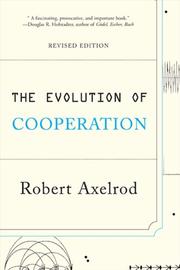Check nearby libraries
Buy this book

"The much-discussed book that explores how cooperation can emerge in a world of self-seeking egoists--whether superpowers, businesses, or individuals--when there is no central authority to police their actions. The Evolution of Cooperation addresses a simple yet age-old question: if living things evolve through competition, how can cooperation ever emerge? Despite the abundant evidence of cooperation all around us, there existed no purely naturalistic answer to this question until 1979, when Robert Axelrod famously ran a computer tournament featuring a standard game-theory exercise called The Prisoner's Dilemma. To everyone's surprise, the program that won the tournament, named Tit for Tat, was not only the simplest but the most "cooperative" entrant. This unexpected victory proved that cooperation--one might even say altruism--is mathematically possible and therefore needs no hidden hand or divine agent to create and sustain it. A great roadblock to the understanding of all sorts of behavior was at last removed. The updated edition includes an extensive new chapter on cooperation in cancer cells and among terrorist organizations."--Publisher.
Check nearby libraries
Buy this book

Previews available in: English
Subjects
Games of strategy (Mathematics), Conflict management, Egoism, Cooperativeness, Social interaction, Consensus (Social sciences), Prisoner's dilemma game, Egoism. 0, Consensus, Égoïsme, Samenwerking, Consensus (Sciences sociales), Speltheorie, Conflictmanagement, Interaction sociale, Coopération (Psychologie), Gestion des conflits, Jeux de stratégie (Mathématiques), Gefangenendilemma, Kooperatives Verhalten, Consenso (Ciencias sociales), Juego Dilema del prisionero, Egoísmo, Juegos de estrategia (Matemáticas), Cooperación (Psicología), Solución de conflictos, Interacción social, Social psychology, Social groups, open_syllabus_project, International cooperation, Games of strategy (mathematics), Consensus (social sciences), Coopération, Consensus (sciences sociales), Jeux de stratégie (mathématiques), Coopération (psychologie), Cooperative Behavior, Psychological Conflict, Ego, Interpersonal Relations, Social Sciences, Game Theory, Cooperacion (Psicologia), Juegos de estrategia (Matematicas), Solucion de conflictos, Egoismo, Interaccion social, Cooperation, Competitive behavior [mesh], Cooperative behavior [mesh], Interpersonal relations [mesh], Conflict (psychology) [mesh], Hm131 .a89 1990, Consenso (ciencias sociales), Juegos de estrategia (matemáticas), Cooperación (psicología), Dilema del prisionero, juego, Hm716 .a94 2006, 302/.14| Edition | Availability |
|---|---|
|
1
The Evolution of Cooperation
December 4, 2006, Perseus Books Group, Basic Books
in English
0465005640 9780465005642
|
aaaa
|
| 2 |
zzzz
|
| 3 |
zzzz
|
| 4 |
eeee
|
| 5 |
eeee
|
Book Details
First Sentence
"UNDER WHAT CONDITIONS will cooperation emerge in a world of egoists without central authority?"
Classifications
ID Numbers
Source records
amazon.com recordLibrary of Congress MARC record
Library of Congress MARC record
marc_openlibraries_sanfranciscopubliclibrary MARC record
Better World Books record
Library of Congress MARC record
Internet Archive item record
Promise Item
marc_columbia MARC record
marc_nuls MARC record
harvard_bibliographic_metadata record
ISBNdb
Work Description
This widely praised and much-discussed book explores how cooperation can emerge in a world of self-seeking egoists whether superpowers, businesses, or individuals when there is no central authority to police their actions
Community Reviews (0)
Feedback?History
- Created April 29, 2008
- 20 revisions
Wikipedia citation
×CloseCopy and paste this code into your Wikipedia page. Need help?
| December 19, 2023 | Edited by ImportBot | import existing book |
| November 29, 2023 | Edited by MARC Bot | import existing book |
| March 7, 2023 | Edited by MARC Bot | import existing book |
| December 24, 2022 | Edited by MARC Bot | import existing book |
| April 29, 2008 | Created by an anonymous user | Imported from amazon.com record |















